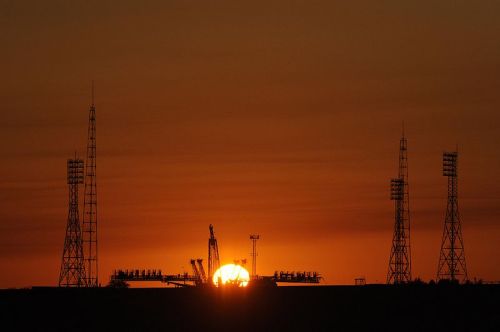
(The Soyuz launch pad in Kazakhstan – Photo Credit: NASA/Bill Ingalls)
The Russian government has boosted the budget of the Russian Federal Space Agency by 1.8 trillion rubles ($52 billion) in order to aid the modernization and expansion of the space agency’s existing infrastructure and capabilities.
Last year, Vladimir Putin presented an outline for the technological development of Roscosmos through 2030 and beyond. The Russian President promised a $52 billion investment towards the revitalization of Russia’s space efforts, a promise which he has now fulfilled.
A Roscosmos statement explained that the money will allow the agency to continue “the access and necessary presence of Russia in space.”
The plan outlined that Roscosmos will expand the number of orbiting satellites to 78 by 2015, and 113 by 2020 “in order to meet the needs of the state,”
For example, the country’s military forces do not have the elaborate network of communications and reconnaissance satellites which they once commanded during the Cold War. When the satellites reached the end of their operational lifetimes during the 1990s, they were not replaced.
Furthermore, the satellite network expansion schedule emphasises the continued production and deployment of GPS satellites, including the newest Glonass-K models. The agency’s new program will attempt to provide Glonass users with navigation data accurate to 1.4 meters by 2015, and 0.6 meters by 2020.
The plan also aims for the development of advanced hardware which will allow Roscosmos to pursue lunar and deep space exploration projects beyond 2020.
Finances will also be set aside to modernise many components of Roscosmos, such as the Soviet-era industrial base which produces the rockets and technology that have enabled Russia to partake in space exploration.
Renovations of the old cosmodromes at Plesetsk, Arkhangelsk and Baikonur, Kazakhstan are planned.
The agency currently leases the Baikonur Cosmodrome from the Kazakh government for $115 million each year, but Roscosmos are constructing a brand new launch facility in the Vostochny Cosmodrome.
Vostochny is set to be the home of Angara, Russia’s newest rocket. This will be the agency’s first launch of a new vehicle since the fall of the Soviet Union.
With media attention focused on the exchange of threats between NASA and Roscosmos, the agency’s budget increase and new space activities plan seemingly went unnoticed.
This is because the information was quietly released on the same day that Deputy Prime Minister Dmitry Rogozin vocalised a series of controversial statements on the future of American and Russian space cooperation.
Rogozin announced that Russia will not partake in NASA’s proposal to extend the life of the International Space Station beyond 2020. The agency will instead invest in other commercially beneficial projects, such as a partnership with the Chinese Space Program.
The Russian space agency’s new space policy appears to be a step towards ensuring that Russia will have the financial freedom to pursue its own interests in space after its obligations with the International Space Station, and NASA, are fulfilled in 2020.
However NASA are also on course to receive a budget boost for the next fiscal year as a $435 million increase has already been voted on and approved by the House of Representatives.
National budget expenditures on space are an important investment in the future of humanity— of course, they remain most politicians’ lowest priority, nowadays—-